Here’s the U.S. President with Your Myers-Briggs® Personality Type
When I was young I used to enjoy reading biographies of the U.S. presidents. It was always interesting to me what a president’s childhood was like, what they struggled with, and what they overcame and fought for. In today’s article, we’re taking a look at the Myers-Briggs® personality types of some of the U.S.’s most influential presidents. While I can’t sit across from any of these leaders, I can reflect on their life stories, their famous quotes, and documentaries I’ve watched about them, to try to get a perspective on their personality types. If you have any different perspectives about their types be sure to let me know in the comments!
DISCLAIMER: As an MBTI® practitioner, I can’t talk to any of these presidents and conduct an official consultation. My guesses as to these president’s types are all based on quotes, memoirs, documentaries, and biographies. These are my best guesses, but they are certainly not empirical.
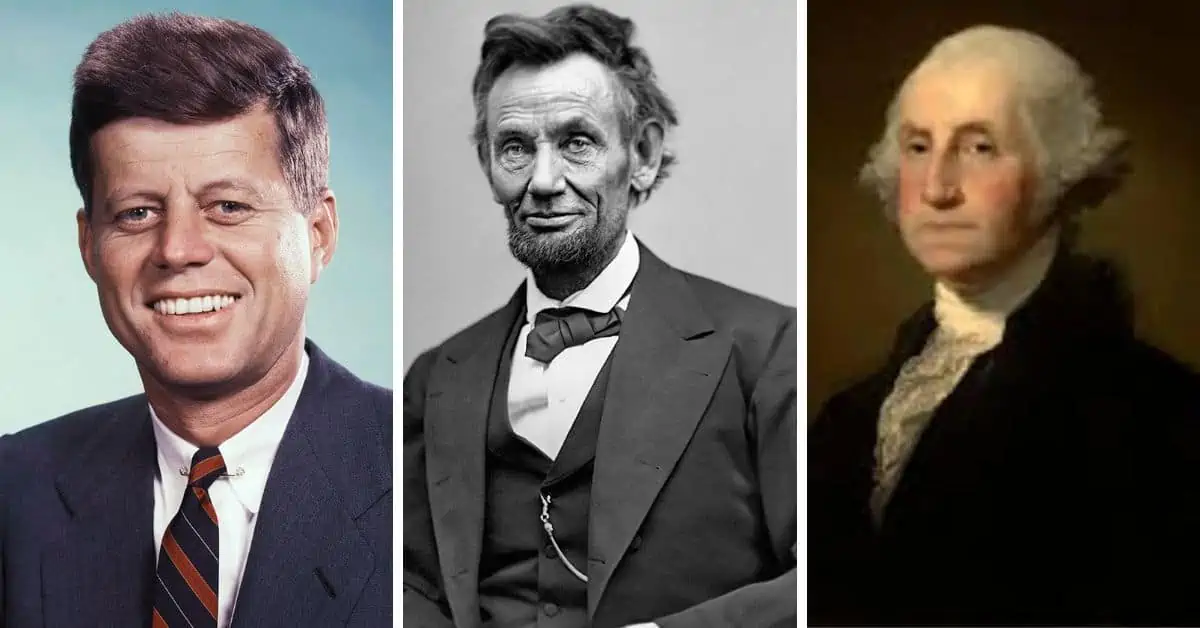
Not sure what your personality type is? Take our new personality questionnaire here. Or you can take the official MBTI® here.
Discover the U.S. President with Your Myers-Briggs® Personality Type
The ISTJ – George Washington
“I hope I shall possess firmness and virtue enough to maintain what I consider the most enviable of all titles, the character of an honest man.” – George Washington
Driven and pragmatic, George Washington expressed the reserved and serious demeanor that is often associated with the ISTJ personality type. Washington was known for being a disciplined man who always conducted himself with integrity. Like most ISTJs, he was methodical in his thinking and often made decisions based on practicality rather than emotion. Loyalty and honesty were crucial to him, and he once said, “It is better to offer no excuse than a bad one.” He believed in being responsible and being authentic, two things that ISTJs value deeply.
In 1775, Washington was nominated to be the commander-in-chief of the Continental Army and he led the American troops to victory in the Revolutionary War. After the war, he served two terms as the first President of the United States. He is often lovingly referred to as the “Father of Our Country.”
While Washington could have gone on as president indefinitely, he decided to step down after two terms, setting a precedent for future presidents. He said, “no person shall be elected to the office of President more than twice” and therefore he was able to keep the leadership of the United States from becoming too much of an echo chamber.
If you’re an ISTJ, you might find that you have some similarities with George Washington. Do you value loyalty and honesty? Are you pragmatic and grounded in your thinking? While Washington was often serious and sensible, he also enjoyed laughter, dancing, and horseback riding. It can be all too easy for ISTJs to get caught up in responsibilities and forget to enjoy themselves. If you can find a balance between hard work and play, you’ll be well on your way to a happy and fulfilling life.
Read This Next: The ISTJ Leader
The ISFJ – Jimmy Carter
“A strong nation, like a strong person, can afford to be gentle, firm, thoughtful, and restrained.” – Jimmy Carter
Former president Jimmy Carter was known for his skills of diplomacy and mediation. Born in a small farming town in Georgia, he had a friendly hometown appeal that helped him win the 1976 presidential election. During his time as president, Carter worked hard to find peaceful solutions to international conflicts. In 1978, he helped broker a peace agreement between Israel and Egypt, known as the Camp David Accords. For this, he was awarded the Nobel Peace Prize.
ISFJs are typically gentle and compassionate people who often put the needs of others before their own. They have a strong sense of duty and are often very loyal to their friends, family, and country. Like Carter, ISFJs often have a strong sense of justice and fair play. They want to make sure that everyone is being treated fairly and that nobody is being left out.
If you’re an ISFJ, you might find that you share some qualities with Jimmy Carter. Are you gentle and compassionate? Do you have a strong sense of duty? Are you interested in justice and fairness? While Carter was a serious president who did important work, he also enjoyed leisure activities such as fishing, woodworking, and playing the ukulele. It’s important for ISFJs to find time to relax and recharge, or they can easily become people-pleasers who never make time for themselves.
Read This Next: What It Means to be an ISFJ Personality Type
The ESFJ – William McKinley
“Let us ever remember that our interest is in concord, not in conflict; and that our real eminence rests in the victories of peace, not those of war.” – William McKinley
William McKinley was the 25th president of the United States and he served from 1897 until his assassination in 1901. He was known for being a strong leader who brought the country together during difficult times. After winning a close election in 1896, McKinley led the country through a period of rapid economic growth. He also presided over the Spanish-American War, and believed that the United States had an obligation and responsibility to help people from other lands.
ESFJs are often natural leaders who are gifted at creating a sense of unity and harmony. Outgoing and gregarious, they enjoy being surrounded by friends and family. McKinley was known for sitting with delegates on his front porch, getting to know them and winning them over with his down-to-earth charm. While his opponent in the 1896 election, William Jennings Bryan, spoke to huge crowds around the country, McKinley won delegates over one-on-one.
People who knew McKinley regarded him as friendly, loyal, compassionate, and intelligent. His devotion was played out in his relationship with his wife, Ida, who was a chronic invalid and struggled with epilepsy. McKinley was known for his patience and caretaking attitude towards her, never once straying in his loyalty.
If you’re an ESFJ, you might find that you have some leadership qualities in common with William McKinley. Are you good at bringing people together? Do you enjoy being surrounded by friends and family? Are you concerned with peacemaking and unity? Like McKinley, you might find that you’re good at one-on-one interactions and that you have a strong sense of duty. Just make sure that you are prioritizing your own self-care as much as you prioritize the well-being of others.
The ESTJ – James Monroe
“Our country may be likened to a new house. We lack many things, but we possess the most precious of all – liberty!” – James Monroe
James Monroe was the fifth president of the United States, serving from 1817 to 1825. He was known for being a strong leader during a time of great transition for the country. After the War of 1812, Monroe presided over a period of westward expansion and increasing sectionalism. In 1819, he helped negotiate the Adams-Onis Treaty, which established the current borders of the continental United States. Monroe was also a strong supporter of the American System, which advocated for high tariffs and infrastructure improvements to encourage economic growth.
Ambitious and energetic, James Monroe was known for his strong work ethic. He was often described as being tall and commanding, with an air of authority. He had a frank way of speaking and hated beating around the bush, but he was also modest and was able to hear perspectives from many different allies and rivals. Outgoing and motivated, he had a knack for persuasion. This helped him to win over support for his policies, even when they were controversial. Like many ESTJs, he had a straightforward and decisive manner about him and wasn’t afraid to make tough decisions for the well-being of the nation.
People who knew Monroe regarded him as intelligent, patriotic, and sincere. Thomas Jefferson once said, ‘Monroe was so honest that if you turned his soul inside out there would not be a spot on it.’ Unlike many people in power, Monroe was noted for having little pretense. He maintained a down-to-earth humility even when he was achieving great things.
ESTJs are known for their leadership abilities and their focus on tradition. If you’re an ESTJ, you might find that you have some qualities in common with James Monroe. Do you have a strong work ethic? Do you have a frank and direct way of speaking? Do you value tradition and stability? Like Monroe, you might find that you’re a gifted leader and that you’re able to win people over to your point of view. Just make sure that you’re open to new ideas and willing to consider change, even when it’s not comfortable.
The ISTP – Zachary Taylor
“The idea that I should become president seems to me too visionary to require a serious answer. It has never entered my head, nor is it likely to enter the head of any other person.” – Zachary Taylor
Zachary Taylor was the 12th president of the United States, serving from 1849 to 1850. He was a career military officer who served in both the Mexican-American War and the Black Hawk War. In 1848, he was nominated by the Whig Party as their candidate for president.
Like many ISTPs, Taylor was known for being unassuming, plainspoken, and quiet. He famously hated to wear formal, fancy clothes and instead preferred to dress in simple clothing that was more comfortable. He was known for his dry sense of humor and for being able to keep a level head in difficult situations. His tactical prowess and calm demeanor made him a powerful military leader, even when he was greatly outnumbered.
A gifted military strategist, Zachary Taylor was known for his bravery and for his willingness to take risks. He was given the nickname “Old Rough and Ready” because of his no-nonsense approach to military conflict and his insistence on fighting alongside his troops in hand-to-hand combat. He was known for being able to quickly adapt to new situations and for having a cool head under pressure.
If you’re an ISTP, you might find that you have some qualities in common with Zachary Taylor. Are you logical and reserved? Do you believe in being scrappy and resourceful? Do you have a quick wit and a sharp sense of humor? Like Taylor, you might find that you’re an effective leader in times of crisis. Just make sure not to push yourself so hard physically that you neglect your own health, as Taylor sometimes did.
Read This Next: Understanding ISTP Thinking
The ISFP – Ulysses S. Grant
“The friend in my adversity I shall always cherish most. I can better trust those who helped to relieve the gloom of my dark hours than those who are so ready to enjoy with me the sunshine of my prosperity.” – Ulysses S. Grant
Ulysses S. Grant was the 18th president of the United States, serving from 1869 to 1877. He was a powerful general during the Civil War and is credited with helping to bring about the Union’s victory.
Grant was an unusual president. He had no political experience before becoming president and was not particularly interested in the day-to-day workings of government. He was, however, a skilled military commander and an extremely effective leader. He was known for being honest and for having a strong sense of moral character. He was also known for being very compassionate, particularly towards those who had been affected by the Civil War.
While many people say that effectiveness and leadership are only qualities Extroverts and Thinking types possess, many other types can be excellent leaders as well, but with their own unique flavor of leadership. Ulysses S. Grant cared little for formality and hated black-and-white judgments. He was able to see many sides to a situation and ultimately strived to make choices he could feel right about.
In his memoirs, Grant often reflected on his decisions, his battles, and the morality behind them. After becoming a celebrated captain in the Mexican-American war, he wrote “I do not think there was ever a more wicked war…I thought so at the time…only I had not the moral courage enough to resign.”
After the South’s defeat in the Civil War, Grant still struggled with conflicted feelings. He wrote that he felt, “sad and depressed…at the downfall of a foe who had fought so long and valiantly, and had suffered so much for a cause, though that cause was, I believe, one of the worst for which a people ever fought.”
People who knew Grant talked about his resilience, modesty, humor, and versatility. He cared little for appearances and often strived for something deeper. His wife, Julia, was often mocked for an eye condition that made her look cross eyed. People found her unattractive, and after Grant won the presidency, she considered medical treatments to try to correct her eyes issue. Grant famously said, “Did I not see you and fall in love with you with these same eyes? I like them just as they are . . . . Mrs. Grant, you had better not make any experiments, as I might not like you half so well with any other eyes.”
After he won the presidency, Ulysses S. Grant worked hard to try to heal the nation, both physically and emotionally. He pardoned many of those who had participated in the Confederacy and helped to ensure that Reconstruction was as peaceful as possible. He also dismantled the KKK and fought for civil rights for former slaves.
If you’re an ISFP, you might find that you have some qualities in common with Ulysses S. Grant. Are you compassionate and forgiving? Do you have a strong sense of morality? Do you care more about what’s going on on the inside than what’s happening on the outside? If so, you might be like Grant in more ways than one!
Read This Next: What It Means to be an ISFP Personality Type
The ESFP – John F. Kennedy
“The rights of every man are diminished when the rights of one man are threatened.” – John F. Kennedy
John F. Kennedy was the 35th president of the United States and is one of the most popular presidents in American history. He was born into a wealthy family and had a privileged upbringing, but he didn’t let that stop him from empathizing with those less fortunate.
Kennedy was known for being charismatic and charming, two qualities that often come naturally to those with the ESFP personality type. He was also known for being an excellent communicator and a gifted speaker. In fact, his famous “Ask not what your country can do for you” speech is still remembered and quoted today.
ESFPs are known for being people-oriented and Kennedy was no exception. He was known for his strong relationships with both his family and his friends. He was also known for being compassionate and caring, two qualities that served him well as president. His friend Lem Billings recalled, “Jack was more fun than anyone I’ve ever known, and I think most people who knew him felt the same way about him.”
While Kennedy was a competent leader, he wasn’t always a high achiever. In high school and college he excelled at the courses he enjoyed but tended to underachieve in classes he found dull. He was known for being mischievous, funny, and a bit of a practical joker. This is a common issue for ESFPs who excel when they can make something fun but often get distracted in classes they find “meaningless.” In Kennedy’s case, that class was often Latin.
During World War II, Kennedy joined the US Navy and eventually became the commander of a patrol torpedo boat. His boat was rammed and split in two by a Japanese destroyer and Kennedy and his crew were stranded in the water for hours. Badly hurt and struggling, Kennedy still managed to haul another wounded sailor and several other survivors to a nearby island, where they were rescued six days later. He showed great courage during this ordeal and was later awarded the Navy and Marine Corps Medal for his “heroism and extraordinary leadership.” He also received a Purple Heart for the injuries he suffered.
During his time in office, Kennedy made it a priority to improve the lives of those less fortunate. He started the Peace Corps, which is still helping people around the world today. He also signed the Nuclear Test Ban Treaty, which helped to ease tensions between the United States and the Soviet Union.
If you’re an ESFP, then you might find that you have some qualities in common with John F. Kennedy. Are you charismatic and charming? Do you have a strong sense of right and wrong? Do you enjoy helping others? If so, you should take Kennedy’s words to heart: “One person can make a difference, and everyone should try.”
Read This Next: What It Means to be an ESFP Personality Type
The ESTP – Theodore Roosevelt
“The only man who never makes mistakes is the man who never does anything.” – Theodore Roosevelt
Theodore Roosevelt was the 26th president of the United States and is one of the most beloved presidents in American history. Born into a wealthy family, Roosevelt’s life might have looked easy at first glance. However, he struggled with severe asthma, heart issues, and other illnesses, and was often bedridden as a child. During this time, he cultivated a love of learning and a passion for animal life and nature. This passion would serve him well later in life.
Despite his health issues, Roosevelt was determined to live a full life. He worked hard to overcome his asthma and became an avid outdoorsman. He was an excellent horseman and learned to box, fence, and wrestle. People who knew him said he was always up for a challenge, no matter what it was. Roosevelt’s adventurous spirit and willingness to take risks are two qualities that often come naturally to those with the ESTP personality type.
Roosevelt entered politics in 1881 when he was elected to the New York State Assembly. He quickly gained a reputation as a reformer and became known for his work on civil service reform. In 1898, he volunteered to lead the Rough Riders, a cavalry unit made up of cowboys and college athletes, during the Spanish-American War. His courageous leadership during the war made him a national hero.
During his time in office, Roosevelt worked to improve the lives of ordinary Americans. He pushed for antitrust laws to help businesses compete fairly, and he regulated the food and drug industry to protect consumers. He also helped to preserve America’s natural resources by establishing national forests, parks, and monuments. It’s thanks to Roosevelt that we have protected sites like the Grand Canyon, countless protected wildlife sanctuaries, protected national forests and national and state parks.
Roosevelt was known for being outgoing and adventurous, two qualities that often come naturally to those with ESTP preferences. He was also known for being a gifted speaker and an excellent communicator. In fact, his famous “The Man in the Arena” speech is still remembered and quoted today. In it, he says, “It is not the critic who counts; not the man who points out how the strong man stumbles, or where the doer of deeds could have done them better. The credit belongs to the man who is actually in the arena.” ESTPs everywhere will applaud this way of thinking because it fits their scrappy, bold, and risk-taking personality perfectly.
Sometimes ESTPs can push themselves too hard and overdo it. They’re famous for taking risks, and Roosevelt was no exception. While delivering a speech on the campaign trail in Milwaukee, Wisconsin, someone named John Nepomuk Schrank attempted to assassinate Roosevelt by shooting him in the chest. Shockingly, he continued his speech for 90 minutes before seeing a doctor! He later chalked up the incident to the hazards of the business.
Roosevelt was someone who defied conventions and pushed for progressivism and change. He was the first president to do many things, one of them being to entertain an African American at the White House. Roosevelt was an avid supporter of desegregation and invited Booker T. Washington to dine with him, something that caused quite a stir at the time.
While Roosevelt’s work as president was groundbreaking, it was not without its critics. Some people accused him of being too brash and impulsive. Others felt he was corrupt and power-hungry. But even his critics couldn’t deny that he was an effective leader who got things done. Do you find yourself relating to Roosevelt’s energy, bravery, and outspokenness?
Read This Next: 24 Signs That You’re an ESTP, the Daredevil Personality Type
The INFJ – Thomas Jefferson
“I have sworn upon the altar of god, eternal hostility against every form of tyranny over the mind of man.” – Thomas Jefferson
Thomas Jefferson was the third president of the United States and one of the most influential figures in American history. He was a gifted writer and thinker, and he was known for his eloquent speeches. An idealist at heart, he advocated for democracy and individual rights and freedoms. While he certainly wasn’t perfect, Jefferson was deeply committed to making America a better place.
Jefferson most likely had INFJ preferences. People who knew him described him as quiet, contemplative, and idealistic. From early life he had a passion for learning. Like many INFJs, he was on a passionate search for meaning and wanted to change the world. This showed up in his love of philosophy, literature, and the arts. As a young boy, he loved to explore in the woods and read about other cultures. Later on, when he attended the College of William and Mary in Williamsburg, he was dismayed that his classmates were betting on horses, gambling, and courting women rather than focusing on their long-term goals and studies. Typical for an INFJ, Jefferson focused more on the future than the present and organized his life in alignment with his vision.
Jefferson was also a gifted writer. He wrote the Declaration of Independence, which is considered one of the most important documents in American history. In it, he eloquently articulates the philosophy of natural rights and the need for government to protect those rights. In his Notes on the State of Virginia, he articulated a vision of the good society he hoped America would become. In his idealistic vision, America would be a virtuous agricultural republic, based on the values of liberty, honesty and simplicity and centered on the self-sufficient yeoman farmer.
As president, Jefferson continued to push for progress. He helped to expand the country by purchasing the Louisiana Territory from France. This doubled the size of the United States and opened up new opportunities for exploration and settlement. He also sent Lewis and Clark on their famous expedition to map out the territory.
While Jefferson was a president who made a huge positive impact on the United States of America, he did have some disappointing flaws. He was notoriously poor with money and was always in debt. He also owned slaves, which contradicted his beliefs in liberty and equality. Despite these flaws, Jefferson left a lasting legacy on America and the world.
Read This Next: 24 Signs That You’re an INFJ, the Mystic Personality Type
The INTJ – John Adams
“It should be your care, therefore, and mine, to elevate the minds of our children and exalt their courage; to accelerate and animate their industry and activity; to excite in them an habitual contempt of meanness, abhorrence of injustice and inhumanity, and an ambition to excel in every capacity, faculty, and virtue. If we suffer their minds to grovel and creep in infancy, they will grovel all their lives.” – John Adams
John Adams was the second president of the United States and one of the most important Founding Fathers. He was a gifted lawyer and thinker, and he played a major role in both the American Revolution and the creation of the Declaration of Independence. He was also a devoted family man and a loyal friend.
Adams most likely had INTJ preferences. People who knew him described him as intelligent, visionary, serious, and hardworking. He was always searching for truth and justice, and he had a strong sense of right and wrong. As a young man, he was fascinated by the law and spent hours reading about legal cases. He also loved to debate with his friends and family members. Adams was known for his quick wit and sharp diplomatic and strategic abilities.
Adams was a gifted writer and thinker. He wrote the Massachusetts Constitution, which is considered one of the most important state constitutions in American history. He also contributed in the writing of a series of essays called The Federalist Papers, which argued for the ratification of the Constitution. In his writings, Adams advocated for a strong central government that would protect the rights of the people.
Although John Adams was a devout patriot, he believed in fairness and truth above all. On March 6, 1770 tensions between British troops and colonists exploded into violence when the redcoats opened fire on a crowd that had pelted them with taunts, ice, oyster shells, and broken glass. While the soldiers vowed that they acted in self-defense, patriot propaganda referred to the event as the Boston Massacre. Eight British soldiers were arrested and charged with the murder of five colonists. While it would have been easier for John Adams to stay out of this situation and appease his colonist constituents, he took on the unpopular task of defending the soldiers. In his closing arguments, Adams said, “Facts are stubborn things; and whatever may be our wishes, our inclinations, or the dictates of our passion, they cannot alter the state of facts and evidence.” This was a brave and unpopular stance to take, but Adams had to do what felt right in his conscience.
As president, Adams continued to push for progress. He helped to negotiate the Treaty of Paris, which ended the Revolutionary War. He also signed the Alien and Sedition Acts, which were controversial laws that limited freedom of speech and led to his impeachment. Despite this mistake, Adams was a highly effective president who made a lasting impact on America.
Read This Next: Inspiring Morning Routines for INTJs, INTPs, ENTJs, and ENTPs
The ENFJ – Joe Biden
“America is an idea. An idea that is stronger than any army, bigger than any ocean, more powerful than any dictator or tyrant. It gives hope to the most desperate people on earth, it guarantees that everyone is treated with dignity and gives hate no safe harbor. It instills in every person in this country the belief that no matter where you start in life, there’s nothing you can’t achieve if you work at it. That’s what we believe.” – Joe Biden
Joe Biden was the 46th President of the United States. He was born in Scranton, Pennsylvania in 1942 and grew up in a close-knit Irish Catholic family. While his family was nurturing and supportive, life outside of home wasn’t always easy. Biden had a pronounced stutter that made it difficult for him to communicate with others. He was severely bullied by his classmates because of his stutter and speech therapy proved useless for him. Over the years he worked tirelessly to rid himself of the stutter, but even now it pops up from time to time.
Despite the challenges he faced, Biden persevered. He went on to graduate from the University of Delaware and then Syracuse Law School. In 1972, at just 29 years old, Biden was elected to the Senate. He became the sixth-youngest senator in American history. As a senator, Biden quickly made a name for himself as a passionate legislator. He was a champion for civil rights and he fought to end discrimination against women and minorities. He also worked to improve relations with the Soviet Union and China. In 1987, he became the chairman of the Senate Foreign Relations Committee.
While we can’t know for sure, from what I’ve seen, I would guess that Biden has ENFJ preferences. If you look at Biden’s life, he’s ultimately done everything he could to align himself with his values and the values of his supporters. He has been known for his candor and his ability to speak from the heart and appeal to others’ hearts. Idealistic and driven, he’s used his diplomatic abilities to build relationships and find common ground with diverse leaders from all over the world. There’s a decisive, in-charge determination about Biden that has helped him to win the presidency and pass important legislation like the Violence Against Women Act. This landmark decision was a huge victory for women’s rights and it would not have been possible without Biden’s courage and tenacity.
Like many U.S. presidents, Biden certainly hasn’t been perfect. He has admitted to making some poor decisions in his past that have led to mass incarcerations and struggles for the very people he wished to protect. However, he has always been quick to take responsibility for his mistakes and learn from them. Like many ENFJs, Biden is constantly growing and evolving and wants to do whatever he can to improve the world for others.
Read This Next: 24 Signs That You’re an ENFJ Personality Type
The ENTJ – Franklin Delano Roosevelt
“Courage is not the absence of fear, but rather the assessment that something else is more important than fear.” – Franklin Delano Roosevelt
Franklin Delano Roosevelt is one of the most iconic presidents in American history. He was born in 1882 into a wealthy family in New York. As a child, Roosevelt was highly pampered and doted on by his family. He was home-schooled by tutors and then went on to attend Groton, an elite boarding school. While many other pampered and spoiled children would only crave a life of luxury, Roosevelt wanted something more. He always knew how to push himself and in later life chose to defend people who suffered from poverty in ways he’d never known.
Visionary and determined, Roosevelt was elected to the New York State Senate in 1911. He quickly made a name for himself as a reformer and he was instrumental in passing several important pieces of legislation, including the nation’s first Workers’ Compensation law. This law provided financial assistance to workers who were injured on the job.
Unfortunately, disaster struck in 1921 when Roosevelt was stricken with poliomyelitis. This disease left him unable to use his legs and he nearly gave up on his dreams. With encouragement from his wife, Eleanor, Roosevelt underwent extensive physical therapy and decided to press towards his goals, even in a wheelchair. While he was never able to fully recover the use of his legs, Roosevelt learned to adapt and live with his disability.
Roosevelt was elected President in November 1932 , to the first of an unprecedented four terms. By March of the next year, 13,000,000 people were unemployed, and nearly every bank was closed. Strategic and dauntless, Roosevelt formed a “brain trust” of advisors and created programs like the Civilian Conservation Corps, which provided jobs for young men during the Great Depression. He also established Social Security, which provided economic security for older Americans.
Like many ENTJs, Roosevelt was committed to hard work. During World War II, he worked tirelessly to ensure that the United States would emerge victorious. He met with world leaders, provided support for the allies, and gave inspiring speeches to boost morale at home. Outgoing, decisive, and organized, Roosevelt employed his ENTJ preferences to make tough decisions and manage many moving parts of the government. Not all of his decisions were good (sending the Japanese to internment camps, for example), but his efforts have made the United States the strong and prosperous nation it is today.
Read This Next: Understanding ENTJ Thinking
The INTP – Abraham Lincoln
“I do not think much of a man who is not wiser today than he was yesterday.” – Abraham Lincoln
Abraham Lincoln, the 16th president of the United States, is one of the most revered leaders in American history. He was born in 1809 to a humble family in Kentucky and grew up in a log cabin. As a child, Lincoln was mostly self-educated. He had little formal schooling but he devoured every book he could get his hands on, including the Bible, Aesop’s Fables, and Shakespeare. On his love of reading, Lincoln once said, “My best friend is a person who will give me a book I have not read.”
Lincoln’s love of learning served him well throughout his life. He was elected to the Illinois state legislature in 1834 and then to the United States House of Representatives in 1846. In 1858, he ran for the United States Senate but lost the election. This disappointment didn’t stop him from pursuing his goals.
In 1860, Lincoln was elected President of the United States. This was a highly polarizing time in American history and the country was on the brink of Civil War. With calm resolve, Lincoln worked to keep the nation together. He gave fiery speeches, like the Gettysburg Address, which called for equality and justice for all. He also issued the Emancipation Proclamation, which freed slaves in the Confederate states. Like many INTPs, Lincoln was quick to spot inconsistencies and hypocrisy. He famously stated, “Those who deny freedom to others deserve it not for themselves, and, under a just God cannot retain it.”
Lincoln was assassinated in 1865 but his legacy lived on. He is remembered as one of the greatest presidents in American history. His commitment to democracy and human rights has inspired people around the world.
INTPs will likely find Lincoln’s story inspiring. Like him, they are analytical and curious – driven to understand the truth without pretense or bias. They are often driven to self-educate because of their love of learning and their desire to amass knowledge and understanding. Logical and precise, they prefer to state the honest truth without being showy or ostentatious.
Read This Next: 24 Signs That You’re an INTP, the Prodigy Personality Type
The ENTP – Barack Obama
“Change will not come if we wait for some other person, or if we wait for some other time. We are the ones we’ve been waiting for. We are the change that we seek.” – Barack Obama
I had a hard time deciding which type seemed best for Barack Obama. There are many different theories about his personality type, but the argument for ENTP seemed to make the most sense (once I finish reading his memoirs I may come back and change this, however). But before we get into the type details, let’s talk a little bit about President Obama.
Obama was born in 1961 to a Kenyan father and an American mother. He grew up in Hawaii and Indonesia before attending college in the United States. After graduating from Columbia University, Obama worked as a community organizer in Chicago. He then attended Harvard Law School, where he became the first African-American president of the Harvard Law Review.
After working as a civil rights attorney and professor of constitutional law, Obama was elected to the Illinois state senate in 1996. In 2004, he ran for the United States Senate and won. Then, in 2008, he made history by becoming the first African-American president of the United States.
During his time in office, President Obama worked to enact sweeping changes in American policy. He signed the Affordable Care Act, which provided health insurance to millions of Americans. He also worked to improve relations with other countries and reduce America’s dependence on fossil fuels.
Like many ENTPs, Obama is a gifted speaker and he has a talent for persuasion. He is often described as charismatic and optimistic. He is also a natural leader and he has a tendency to take risks. ENTPs at their best can see both sides of a situation and mediate effectively. When ENTPs are unhealthy, they can argue both sides just to mess with people’s heads. When they’re mature, however, they use this skill to find solutions that work for everyone.
Obama’s logical side shows up in his tendency to value data and logic and explain his decisions through the lens of reason. He once said, “I based my presidency on facts and reason and logic.”
And in typical ENTP fashion, Obama has never shied away from an argument. When asked why he wrote his Nobel Peace Prize speech himself, he said, “I wanted to make an argument that didn’t allow either side to feel too comfortable. [As an adolescent I was] arguing all the time, usually about me failing to abide by … petty and arbitrary rules. I found that I could generally win these arguments.”
Obama also has a more spontaneous, flexible approach to life than people realize. His wife Michelle stated, “Barack has helped me to loosen up and feel comfortable with taking risks, not doing things the traditional way and sort of testing it out, because that is how he grew up . . . he’s just more out there, more flamboyant.”
If you’re an ENTP, whether you admire Obama or not, you can probably see a little bit of yourself in him. Take some time to read up more about his life, you just might be inspired to achieve great things yourself.
Read This Next: A Look at the ENTP Leader
I couldn’t find any U.S. presidents with INFP or ENFP preferences, so I’m posting two influential political figures with those types instead.
The INFP – John Kerry
“I know there are a lot of musicians and a lot of artists, and there are a lot of writers and other people who inspire young people, but I’d like to see somebody in political life be able to connect and make these choices that we need to make in Washington real in terms of people’s lives.” – John Kerry
INFPs are idealists. They are driven by their values and they want to make the world a better place. John Kerry is an excellent example of an INFP in action.
A Vietnam War veteran, Kerry became interested in politics after returning home and considering his experiences as well as seeing the way his fellow soldiers were treated. During his time in Vietnam he did many courageous things. At one point, while injured and under gunfire, he turned his boat around to rescue a soldier who was adrift in the water. Another soldier later testified that Kerry saved his life as well.
While Kerry earned three purple hearts, a silver star, and a bronze star for his service in Vietnam, he was morally conflicted over his time there. When he returned home he formed the Veterans Against the Vietnam War. With nearly one thousand Vietnam War veterans, he marched the US capitol and gave an impassioned speech before the Senate Foreign Relations Committee. In it he said,
“The country doesn’t know it yet, but it has created a monster, a monster in the form of millions of men who have been taught to deal and to trade in violence, and who are given the chance to die for the biggest nothing in history; men who have returned with a sense of anger and a sense of betrayal which no one has yet grasped…..We are angry because we feel we have been used in the worst fashion by the administration of this country…..because so many of those best men have returned as quadriplegics and amputees, and they lie forgotten in Veterans’ Administration hospitals in this country which fly the flag which so many have chosen as their own personal symbol. And we can not consider ourselves America’s best men when we are ashamed of and hated what we were called on to do in Southeast Asia.” You can read his entire speech here.
Kerry is a passionate and driven man who has worked tirelessly to improve the world in a way that aligns with his values. Even if you don’t agree with his political views, it’s hard not to admire him for his convictions. Kerry is known for his dedication to peace and his efforts to find diplomatic solutions to international conflicts. He was a major player in the Iran nuclear deal and he worked to normalize relations with Cuba. He is also a strong advocate for the environment and he has worked to reduce America’s dependence on fossil fuels.
INFPs are often compassionate and empathetic people. They have a strong and personal sense of right and wrong and want to find a way to make a difference for the underdogs of the world. If you’re an INFP, you might be inspired by Kerry’s dedication to making the world a better place.
Read This Next: A Look at the INFP Leader
The ENFP – Victoria Woodhull
“It makes no difference who or what you are, old or young, black or white, pagan, Jew, or Christian, I want to love you all and be loved by you all, and I mean to have your love.” – Victoria Woodhull
ENFPs are passionate people who love to think outside the box and consider life in unconventional ways. They are driven by their values and they want to make the world a better place. Victoria Woodhull is an excellent example of an ENFP in history.
Born into a family where she was frequently abused and starved, Woodhull had a tough childhood. Despite the challenges she faced, she was determined to make something of herself. An ardent supporter of women’s rights, Woodhull became the first woman to run for president in 1872.
During her campaign, Woodhull advocated for women’s suffrage, free love, and an end to corruption in government. While she didn’t win the election, she made a significant impact on American politics. She often spoke in defense of women’s rights, especially in regards to their sexual and marriage choices. In her day, women who divorce were stigmatized and ostracized by society. She hoped to change that.
“To woman, by nature, belongs the right of sexual determination. When the instinct is aroused in her, then and then only should commerce follow. When woman rises from sexual slavery to sexual freedom, into the ownership and control of her sexual organs, and man is obliged to respect this freedom, then will this instinct become pure and holy; then will woman be raised from the iniquity and morbidness in which she now wallows for existence, and the intensity and glory of her creative functions be increased a hundred-fold.” – Victoria Woodhull
Woodhull’s desire to give women more freedom over their choices could have stemmed from many things. Biographer Barbara Goldsmith claimed that Woodhull was sexually abused by her father at a very young age. At the age of 15, Woodhull married a man 13 years her senior, a doctor by the name of Canning Woodhull. However, she soon learned that her husband was unfaithful and an alcoholic. Eventually, Victoria divorced her husband and faced a lot of the stigma and ostracism that she later spoke against.
While Victoria Woodhull never became president of the United States, she was a woman who broke many barriers. She was the first woman to run for president, the first woman to operate a brokerage firm on Wall Street, and the first woman to start a weekly newspaper. ENFPs can learn a lot from her story and can be inspired to fight for their own beliefs.
Read This Next: A Look at the ENFP Leader
What Are Your Thoughts?
Did you enjoy this article? Did you find any of these individuals motivating or inspiring? Let us know in the comments!
Explore more about your personality type in our eBooks, Discovering You: Unlocking the Power of Personality Type, The INFJ – Understanding the Mystic, The INTJ – Understanding the Strategist, and The INFP – Understanding the Dreamer. You can also connect with me via Facebook, Instagram, or Twitter!
Sources:
The Complete Personal Memoirs of Ulysses S. Grant
Victoria Woodhull, Wikipedia Page
John Kerry Vietnam War Protest Speech
A Promised Land by Barack Obama
Barack Obama, Introspective ENTP?


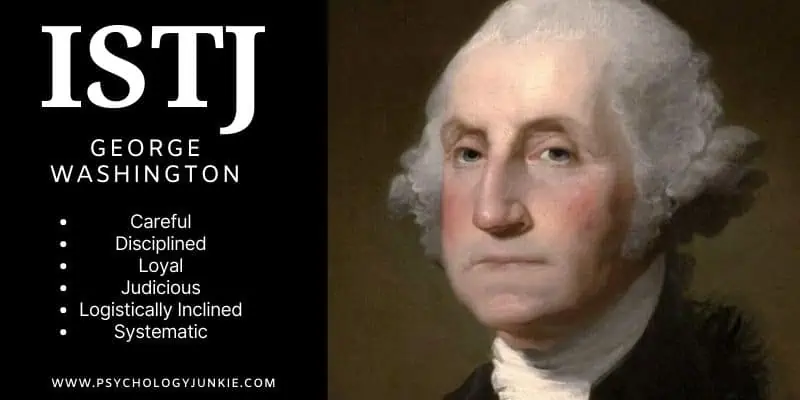
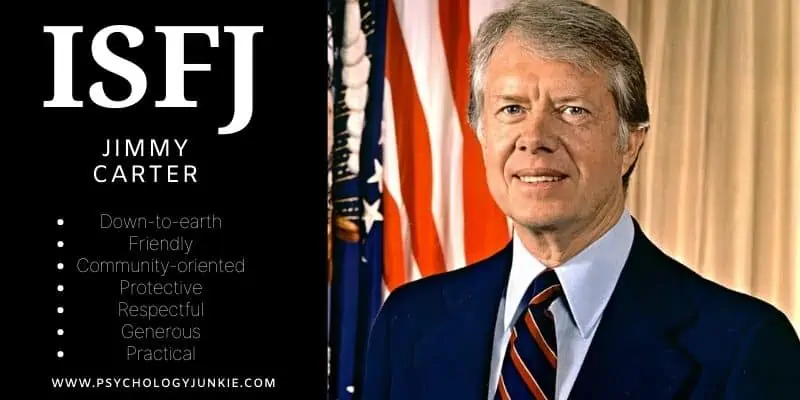
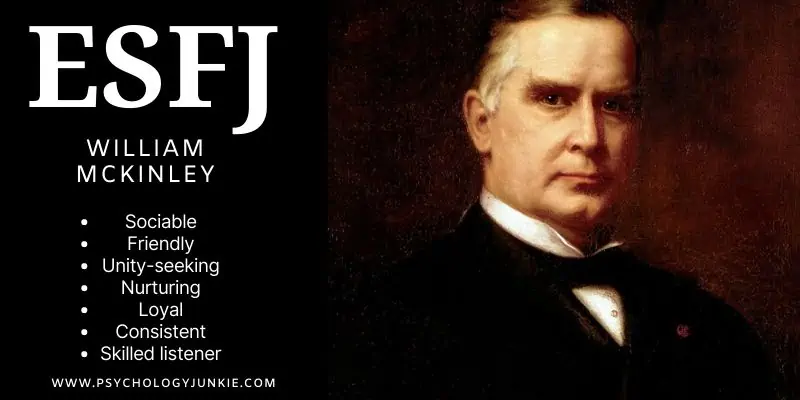
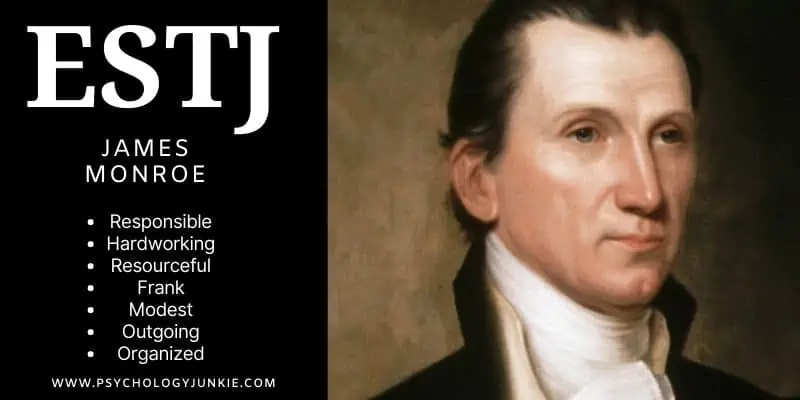
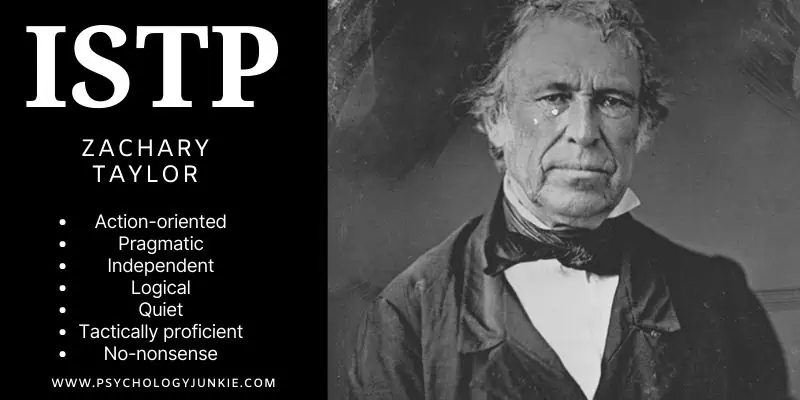
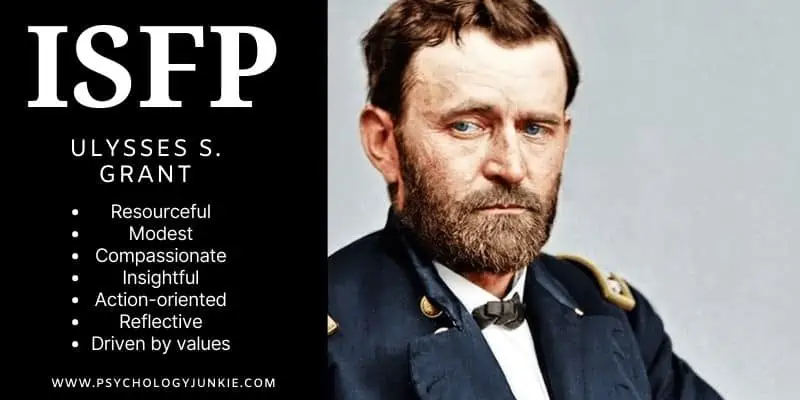
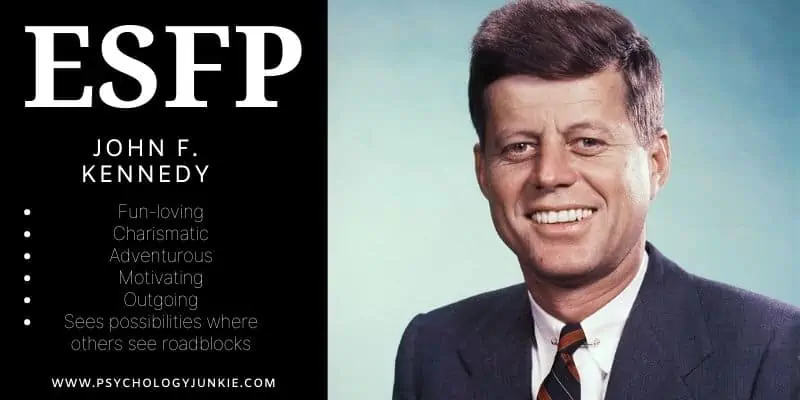
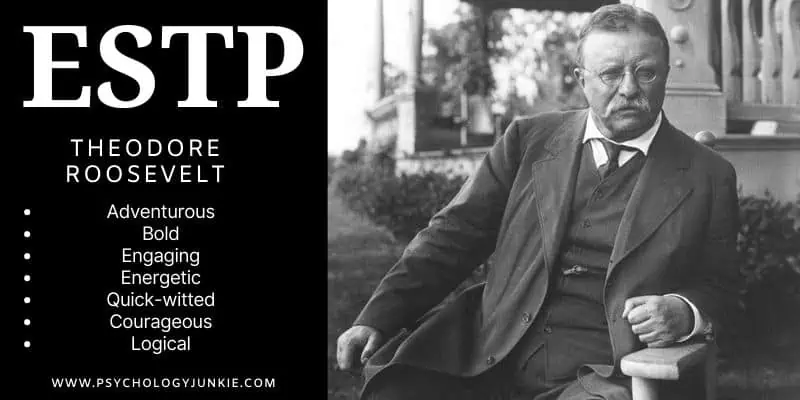
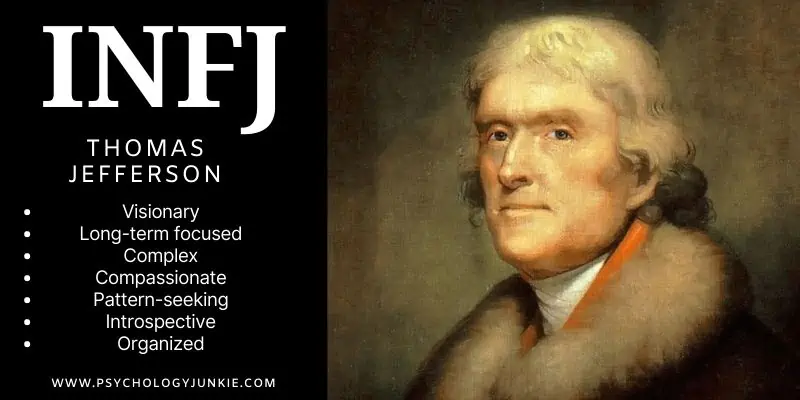
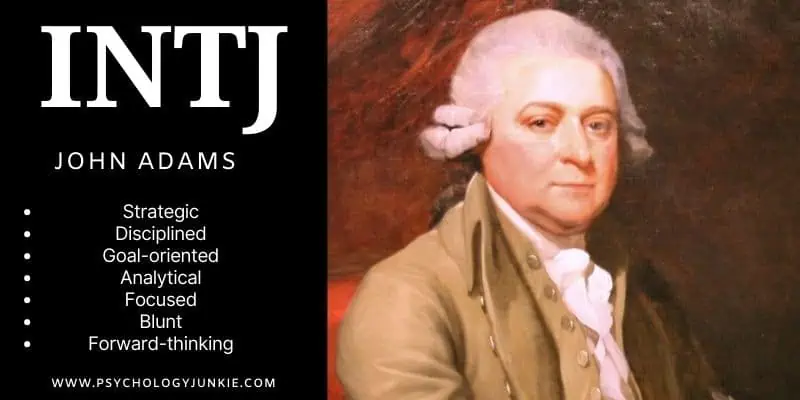
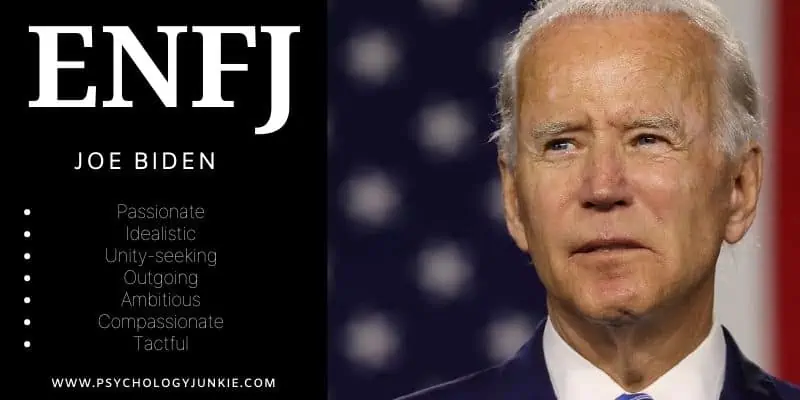
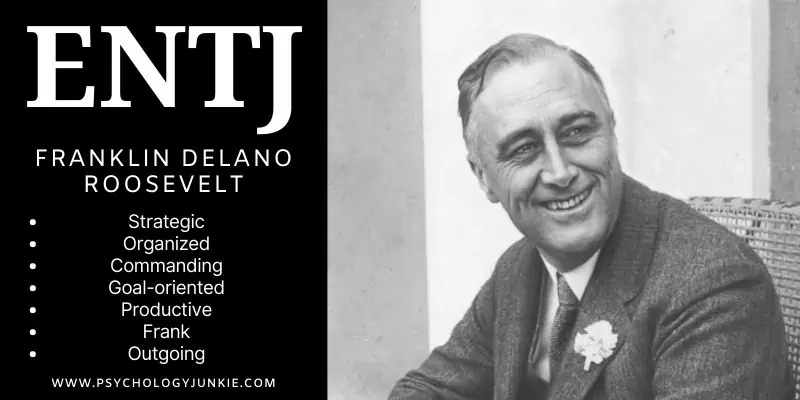
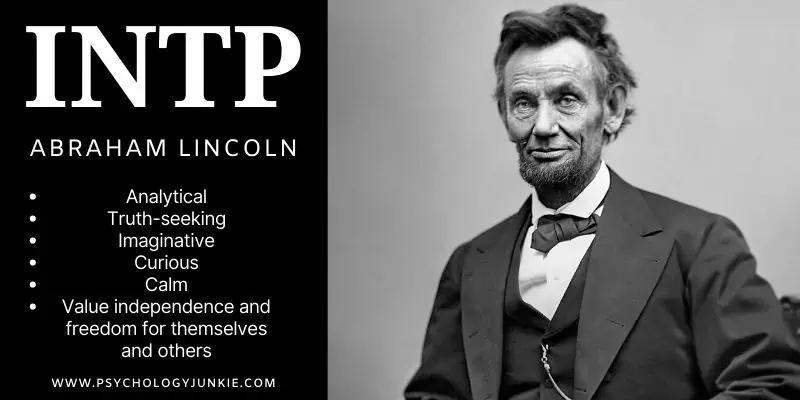
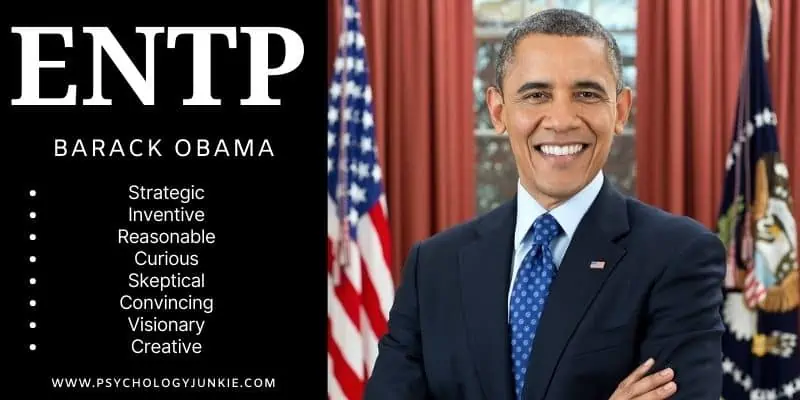
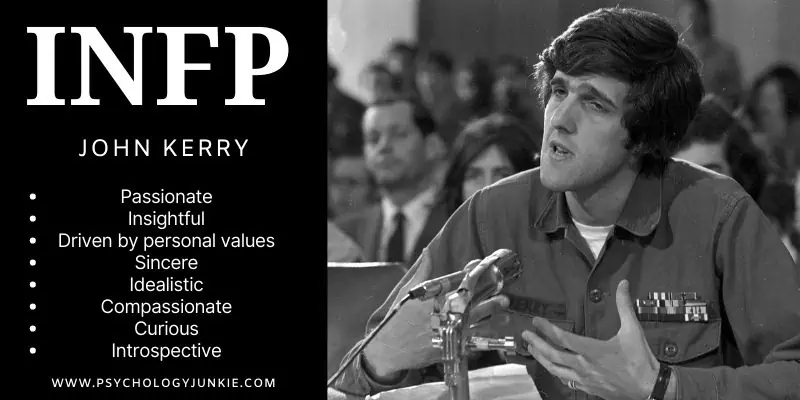
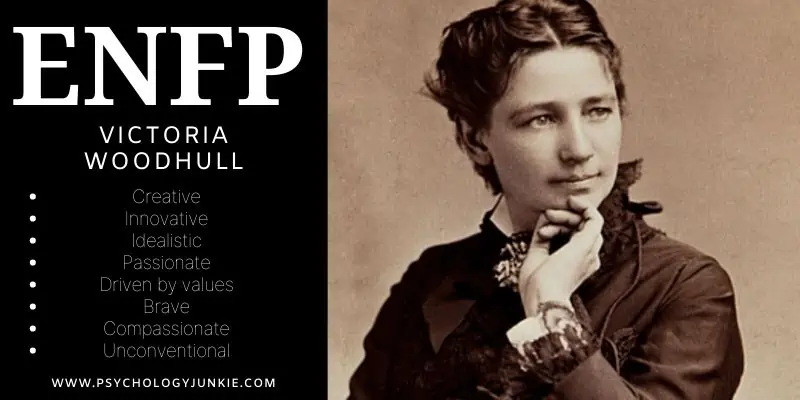






I agree with all your picks except Biden. I don’t see him having the IQ of an ENFJ. He got very poor grades in college and plagiarized another student’s work, which an ENFJ would never have to do, because ENFJs have the IQ to succeed on their own in academia. Politicians usually appear to be idealists because they have to align publicly with the principles of their party. In terms of Biden’s speeches, we have no idea if he wrote them or not. I would guess that he didn’t. I don’t see Biden, at least as president, having “in-charge determination.” When push comes to shove, he folds.
I think people of all personality types can have a wide range of intelligence. However, ntjs are likely to be the smartest since that involves abstract thought, logic, and planning. Biden is an idiot now in his old age, and a copycat in his youth. But that doesnt really speak to his personality when it comes to mbti.
(Whoops, I submitted a comment with a typo.)
This was a fun article. I was kind of hoping that Ronald Reagan would be the ENFj, haha! Did you look into his personality preferences, at all? If you did, which personality type do you think he had?
I have been classed with President Adams, the INTJ on the list. I’ve also seen President Eisenhower categorized as INTJ. What would your thoughts be on President Polk? I have read almost all of the biographies of Polk and think that he was a brilliant political tactician, strategist and master of the “Long Game.” I’d describe him an the United States’ version of Otto von Bismarck. Of all the presidents, Polk was the only one to keep a daily diary during his time as President and I would think that by reading it, you could draw some fascinating conclusions about his temperament and other personality traits. I would encourage you to do so, Ms. Storm, and report back to us.
I did some research into Polk, but the information I found online was limited. I will look up his biography/diaries and see if I can find those! I love reading memoirs and diaries so I’m excited about this 🙂 I also haven’t researched enough about Eisenhower. He’s another one I need to do more research on! As I read and research more I will likely come back and add to this article.
I already knew that’s no INFP/ENFP president, especially in the US!!! Hahaha, that would be utopia! I don’t think I will live to see one, either. Humanity is not ready for that yet. Hence, I’m going back to the quote of probably the most unpopular political leader of all times, but still a saying I find true to the core: “The more I know people the more I love dogs” 🙂
I find it disturbing that Joe Biden was included; him being the most incompetent man to be called “president.” Not to mention the horrible racist he is. Where as Trump, one of, if not the most politically impactful presidents to be in office, was not included. Instead Barack Obama was included (Trump has the same personality type) who was elected purely because he is black. I am Native American and I find this unfair and disturbing.
This is not a list of the best Presidents. It’s a display of various Myers Briggs profiles. Some of the above Presidents were not great; however, they are fairly well known which aids the reader in relating to the archtype.
Trump is an obvious unhealthy ESTP. Being unhealthy, he is not particularly useful in presenting the archetypical ESTP. Trump is about as far from (N) as can be.
I’ve read that Bill Clinton said he was typed as an Enfp. Have you heard that?
I’ve heard that and can see it.